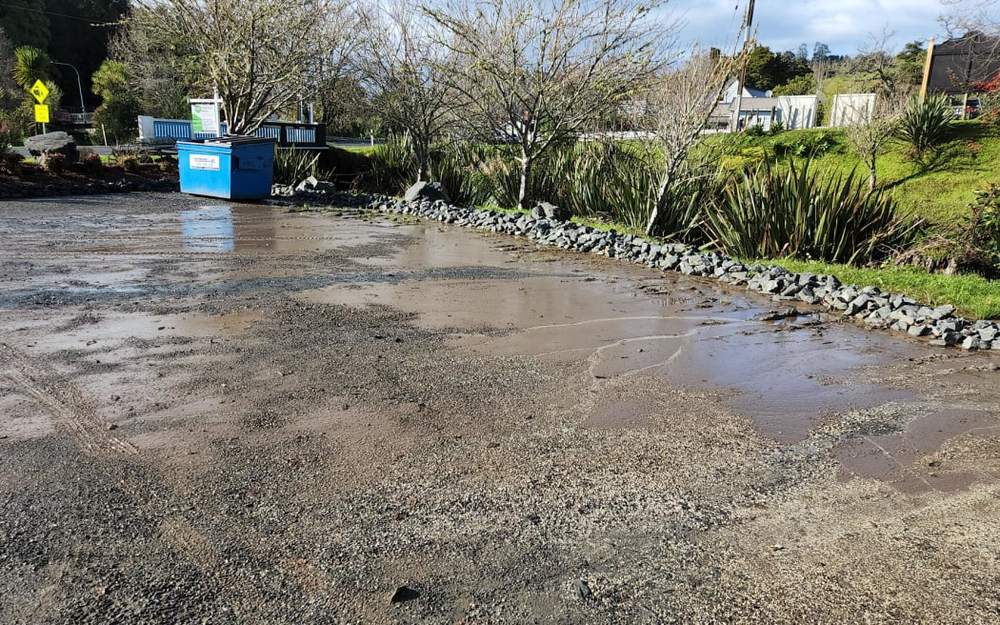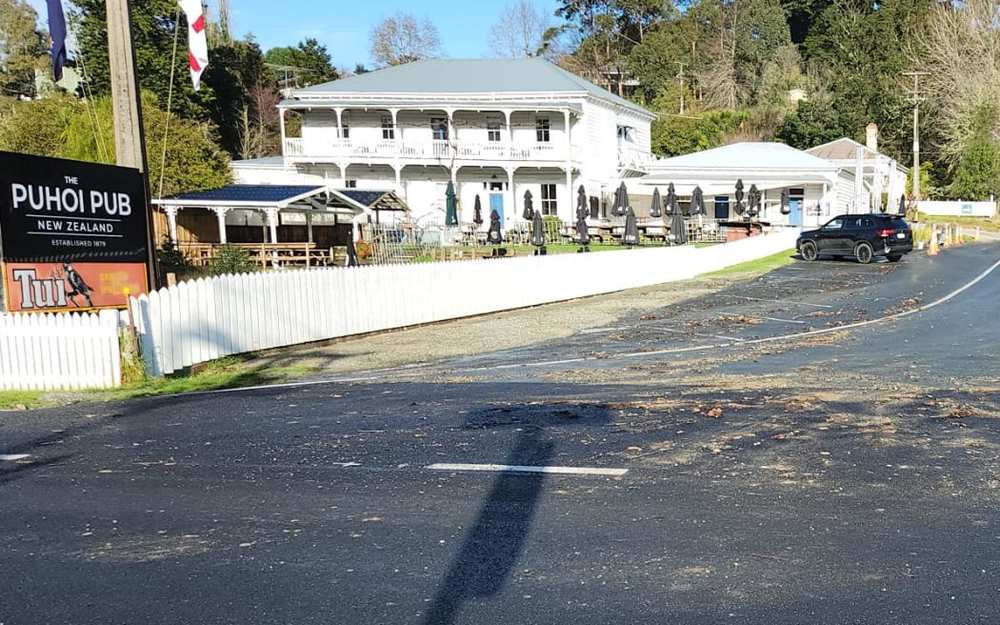Puhoi's massive flooding this week a good reminder to be prepared
Anita Savin for Matakana Coast App
10 August 2022, 11:03 PM
 RNZ
RNZA recent storm this week smashed Puhoi. It forced trees down, caused slips, flooding, with silt and debris everywhere. Locals could hear and feel thunder so loud it shook houses (a seemingly rare phenomenon). Puhoi has had flooding and storms before but not this this event.

The aftermath of flooding in Puhoi. Photo: RNZ / Finn Blackwell

Flooding water subsided at Puhoi Pub. Photo: RNZ / Finn Blackwell
It is a good idea to be prepared as much as possible for future flooding events.
Get Flood Ready website has useful advice on what to do if you experience flooding.
https://getready.govt.nz/en/emergency/floods/
According to Get Ready website:
Reduce the impacts of floods
Find out what the flood risk is in your area. Your local council may have resources and information on how to reduce potential flood damage.
Review your insurance regularly. Having insurance cover for your home and contents is important to help you get back on your feet if you suffer damage in a disaster.
Get ready before a flood
Find out from your local council if your home or business is at risk from flooding and how they’ll alert you if you need to evacuate. Ask about:
- Evacuation plans and local public alerting systems
- What to do with your pets and livestock if you have to evacuate
- How you can reduce the risk of future flooding to your home or business
Work out what supplies you might need and make a plan together.
Practise your emergency plan and your evacuation route to higher ground.
Take measures to reduce potential flood damage and make sure your insurance policy covers you for flood damage.
What to do during a flood
Put safety first. Don’t take any chances. Act quickly if you see rising water.
Floods and flash floods can happen quickly. If you see rising water do not wait for official warnings. Head for higher ground and stay away from floodwater.
Stay out of flood water
Never try to walk, swim or drive through flood water. Many flood fatalities are caused by people attempting to drive through water.
Always assume that flood water is contaminated with farm run-off, chemicals, and sewage. Contaminated flood water can make you sick. Make sure you wash your hands, clothes, and property after contact with flood waters.
If flooding is possible:
Stay informed in an emergency. Listen to the radio (RNZ, The Hits, NewstalkZB, MoreFM, Magic Talk) or follow your Civil Defence Emergency Management Group online.
Be prepared to evacuate and keep your grab bag nearby. Listen to emergency services and local Civil Defence authorities. Follow any instructions about evacuation of your area. Self-evacuate if you feel unsafe.
Move pets to a safe place and move stock to higher ground. If you have to leave, take your pets with you. If it’s not safe for you, it’s not safe for them.
Turn off water, electricity and gas if advised to.
Move valuable and dangerous items as high above the floor as possible. This includes electrical equipment and chemicals. Use watertight containers to store important items.
Lift curtains, rugs and bedding off the floor.
Check on your neighbours and anyone who may need your help.
What to do after a flood
Only return home after Civil Defence and emergency services have told you it is safe to do so. It may not be safe to return home even when the floodwaters have receded.
Stay away from damaged areas. You might hamper rescue and other emergency operations and be at further risk from the residual effects of floods.
Look before you step. After a flood, the ground and floors may be slippery or covered with debris, including broken bottles and nails.
Help others if you can, especially people who may need extra help.
If your property is damaged
- Do not do anything that puts your safety at risk or causes more damage to your property.
- Contact your insurance company as soon as possible.
- If you rent your property, contact your landlord and your contents insurance company.
- Take photos of any damage. It will help speed up assessments of your claims.
Food safety after a flood
Throw away food and drinking water that has come into contact with floodwater, including canned goods.
Avoid drinking or preparing food with tap water until you are certain it is not contaminated. Follow any boil water notice instructions from your local authorities.
For more information on food safety during and after an emergency visit the Ministry for Primary Industries website.
Cleaning up after a flood
Clean and dry your house and everything in it. Floodwater can make the air in your home unhealthy. When things get wet for more than two days, they usually get mouldy. There may also be germs and bugs in your home after a flood.
Mould may make some people with asthma, allergies, or other breathing problems sick.
Talk to your doctor or another medical professional if you have questions about cleaning or working in a home that has been flooded. If there is a large amount of mould, you may want to hire professional help to clean up the mould.
Protect yourself by wearing:
- a certified respirator
- goggles
- gloves
- protective clothing that covers your arms and legs, and
- sturdy footwear.
Throw away anything that was wet with flood water and can’t be cleaned.
Throw away any wooden spoons, plastic utensils, and baby bottle teats and dummies if they have been covered by floodwater. There is no way to safely clean them.
Disinfect metal pans and utensils by boiling them in clean water.
For more resources head to the website https://getready.govt.nz/en/emergency/floods/


